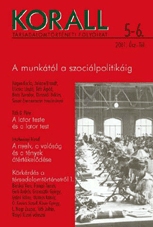A „szociális kérdés” kezelésének alternatívái a 19. század végén. Az 1891-es kötelező betegbiztosítási törvény keletkezése
Alternatives of Managing Social Problems at the End of the 19th Century. The Formation of the 1891 Mandatory Health Insurance Law
Author(s): Zsombor BódySubject(s): History
Published by: KORALL Társadalomtörténeti Egyesület
Keywords: social history; Hungary; 19th century; Health Insurance Law; workers’ movements; chambers of commerce; Parliament debate
Summary/Abstract: The 1891 Workers’Mandatory Health Insurance Law and the 1893 Accident prevention and The Factory Supervision Acts of Hungary followed similar ones in Austria and Germany. The article deals with the development of these laws, presenting the alternatives, which were considered during the process. The weakening of the Hungarian workers’ movements was not among the goals of the law, in spite of Germany. They more likely wanted to eliminate problems of the growing Hungarian economy. Experts of the Ministerial Office acted more like reformers of the society, dealing with theoretical problems. Documents of the developing talks with different business federations show that the insurance could not be expanded to agriculture (in spite of Germany), because there was a great political opposition against it. It was also obvious, that the handicraft entrepreneurs were against any accident isnsurance act. Finally instead of this, a mandatory health insurance law was accepted, combined with an accident prevention, a factory supervision and a Sunday rest act. This law covered all industrial workers, and formed new regional bursaries by the existing insurance bursaries.
Journal: Korall - Társadalomtörténeti folyóirat
- Issue Year: 2001
- Issue No: 5-6
- Page Range: 72-93
- Page Count: 22
- Language: Hungarian

